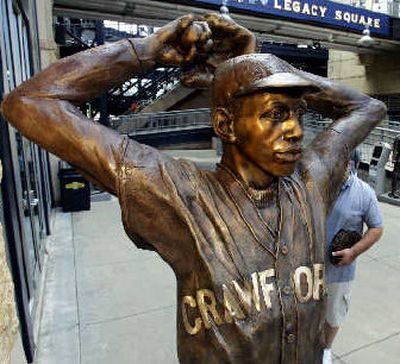Black roots not forgotten

PITTSBURGH – Baseball in Pittsburgh wasn’t always about Roberto Clemente, Barry Bonds or Honus Wagner. It also was about Satchel Paige, Josh Gibson and Cool Papa Bell, too, during an 11-year stretch of championships in the 1930s and 1940s unmatched by any city in the sport.
As baseball breaks for the All-Star Game tonight at PNC Park, some of the game’s greats who never played in the majors or did so only briefly because of racial discrimination are being remembered.
The Pirates recently unveiled at PNC Park seven statues of former black baseball stars who played in the city, as part of an exhibit about the black game that includes interactive kiosks and educational films.
All seven players are enshrined in Cooperstown, although only Paige played in the majors. Considered by the likes of Bob Feller as the greatest pitcher in history, Paige was at least 41 (and possibly older) when he was a Cleveland Indians “rookie” in 1948 – a year after Jackie Robinson broke the color barrier.
The seven played for either or both of Pittsburgh’s two black teams, the Crawfords and the Homestead Grays, during the span from 1925-50 when the city had at least one black team. The Crawfords won the Negro National League title in 1935 and 1936, and the Grays won each of the next nine seasons through 1945.
Think a team composed of Paige or Smokey Joe Williams pitching, Gibson catching, Buck Leonard at first base, Judy Johnson in the infield and Bell and Oscar Charleston in the outfield wouldn’t have been a contender in the majors?
“While segregation was a very sad chapter in the nation’s history … they (the Grays and Crawfords) built a sense of cohesion in black Pittsburgh,” said Rob Ruck, a University of Pittsburgh professor and black baseball historian.
Paige was so good that some historians estimate he won 2,000 games from the sandlots to the majors during a career that spanned five decades and multiple generations. The first three games he pitched for the Indians drew a combined 200,000-plus and he had enough ability at age 58 in 1965 to pitch three shutout innings for the Kansas City Athletics during one of owner Charlie Finley’s ticket-selling gimmicks.
No doubt there were numerous arguments in Pittsburgh during the 1930s whether the Pirates could beat either the Grays or Crawfords.
“Pittsburgh was called the center of black baseball,” Sean Gibson, the catcher’s great grandson, said during June 26 ceremonies in Pittsburgh for the most ambitious black baseball memorial outside of the Negro League Baseball Museum in Kansas City.
Fittingly, it also was on Sept. 1, 1971, when, without fanfare for a game against the Phillies, the Pirates became the first major league team to start a game without a single white player. The Pirates had so many black or Latin stars (Clemente, Willie Stargell, Al Oliver) that some players that night didn’t immediately recognize the significance of the event.